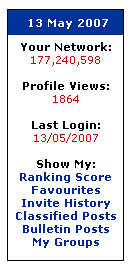Validation of a persons self-worth is a key aspect of being human. Why do we like praise, but not criticism? Because the former validates our self-esteem, the latter contradicts it. Insecure people tend to seek more validation from other peoples opinions – because they need other peoples opinions to validate their self-esteem. Wonder why the modest don’t boast? It’s because their validation is not derived from having to tell you so that you know. They already know you know, and if you don’t agree, they don’t care – they’re self validated.
However no matter how secure you are with yourself, everyone loves a bit of validation – it’s just some people need it more than others, or possibly, we all have different ways in how we validate ourselves. Some fish for compliments on their looks; others validate themselves through great achievements. Validation of who we are, is what drives almost everything we do. That’s why an atheist should never bag out religion to a believer – the argument about whether God exists is irrelevant; what is relevant, is that by criticising the existance of a religious establishment, you are actually criticising a person’s self-identity that has been built on that establishment, by effectively de-validating their belief system.
Motivation systems are complex, and I by no means claim to be an expert – but I do know, that the power of feedback is one of the most effective ways of motivating an individual, especially when it comes to content creation. In the context of web-services, recognition and validation are key: people will stick around on your site, if they feel a greater sense of self-worth because of it.
There are two ways people feel validated on online communities: analytics and responses. Analytics in the sense of statistics: page and profile views, unique visitors, popular content. Most bloggers arn’t really making money out of their blog – so why is software that provides statistics on their readership so popular? Because knowing people read your blog, is a form of validation. A bit like how an insecure teenage girl feels validated by the attention she  gets from sleazy older men. Right now, I am writing this blog entry because a reader asked if I could write more about the interaction between psychology and successful web start-ups. His comment validated my opinions, spurring me to write more on the subject.
gets from sleazy older men. Right now, I am writing this blog entry because a reader asked if I could write more about the interaction between psychology and successful web start-ups. His comment validated my opinions, spurring me to write more on the subject.
Likewise, Myspace users will post a “Thanks for adding me” comment on a new friend. Why? Because it means more people will visit their profile. The reason I can say there are ulterior motives to just thank someone, is because they could have said “thanks for adding me” as a private message. So it then begs the question of why do they want more people to visit their profile? Because people get an ego boost seeing their page count go up.
Statistics to something you’ve created, are a quiet form of feedback. The more views, the more validated you feel by that. Popularity is a great feeling!
A second type of validation, is a bit more direct: it’s through the interactions with people. When people create content – photos, blog postings, whatever – nothing is more satisfying for them than a comment.
Features like Flickr’s recent activity are also apparently, what makes it so addictive. Again – it’s a form of validation. By responding to something someone has created, you are giving value to that creation – that feedback can make someone justify the effort, by providing recognition.
Sometimes the most powerful way a boss can keep their employees satisfied, is by a simple “thank you”. Recognition for effort expended by someone, can sometimes be all that someone needs to keep going.
Think you have a killer web2.0 app? You might. But unless a user feels like they are getting feedback on their existance and content creation, their first visit will likely also be their last. Feedback feels good. People want to feel good. So go and make them feel good about themselves.





